- Home
- William Kowalski
The Adventures of Flash Jackson Page 7
The Adventures of Flash Jackson Read online
Page 7
“Do you…ubb…want to ged togedder or anythig?”
“Well, tell you the truth, Robs, it’s kind of hard for me to get around,” I said. “I was really only calling to—”
“I could cub ub dere!” she said, excited. “You wad me do? We could hag out!”
“I’ve got all kinds of IV tubes in me, and machines and everything,” I said. “You know those screens that show your heartbeat and your brainwaves and all? It’s not pretty, Robs. They had to shave my head.”
“You’re kiddig!” she said. “Why did they do thad?”
“Brain problems,” I said shortly, thinking I must have BIG brain problems to be calling this character. What the hell was I thinking? “I’m not really ready for visitors yet, Robs. Won’t be for a few weeks. I was just calling to sort of…I don’t know, keep in touch with people.”
“Well, baby wed you’re bedder we could hag out,” she said. “Ogay?”
“Okay,” I said. “I’ll give you a call when I’m up and around again. Sound good?”
“Thad souds real good,” she said. “Ged well sood, Haley.”
“Thanks, Robmaster,” I said. “Don’t take any wooden nickels.”
She laughed like that was the funniest thing she’d ever heard.
“Bye,” I said, and I hung up, feeling like I’d just dodged a bullet, as they say.
Then I heard the screen door screech open and slam shut, and I knew my mother figure was home again. She’d been up sitting with Mrs. Grunveldt these last few days, just generally holding her hand and trying to calm her down. That was kind of like asking the fattest man in the world to teach aerobics—I mean, in order to make people feel calm, you have to be kind of on an even keel yourself, and old Mom was anything but, even on a good day. I hadn’t seen her much since Frankie hopped the fence. She just came home to sleep and change clothes, and the rest of the time they kept up their vigil at the Grunveldt’s, hoping Frankie would show up. Or barring that, that there would be a call from the cops, saying We found him, looks like the coons been nibbling on ’im for a couple of days. You want to come down here and identify the poor slob?
I don’t mean to sound too disrespectful. Fact was, I couldn’t manage to get myself as worked up over it all as everyone else. That was because I just had a good feeling about Frankie. I don’t know why, exactly. I just had the sense that he was okay, that he was in a safe place and there was somebody taking care of him. I mentioned before that I inherited a kind of what you might call natural instinct for telling things about people’s health, mostly my own but sometimes other people’s too, which I have every reason to believe was passed on to me from my grandmother. You don’t have to believe it yourself, but you have to believe that I believed it. I do think a person can be born knowing certain things, almost like they get passed on in your genes. But I think there were other things I’d gotten from the old forest lady too, other “abilities,” you could say, that hadn’t begun to flower yet but which were coming up in me as of late. By this I mean that sometimes I knew other things I didn’t have any reason to know.
My grandmother wasn’t known only as a healer. She was sometimes asked to answer questions that nobody else could answer, such as Will I have children, or Is there water on my land and if so where, or What will the price of corn be in three years. She wasn’t too good at questions like that last one, to be honest, but that didn’t stop people from asking her. It’s amazing the kind of hocus-pocus people will lower themselves to if they get desperate enough. She even had a method for finding out the answers to these questions, a little ritual to peek through what she called the Veil—I’d seen her do it once, but there are some things it’s better not to report on. People don’t need to know everything about my family. Just the public parts.
Anyway, I had reason to believe that looking through the Veil was something a person could be born with, just like black hair or a big nose. And I was getting pretty sure as of late that I’d been born with it. I didn’t see visions of the Four Horsemen or anything like that, but sometimes I did know well in advance when it was going to rain—before the clouds came in, I mean—and other times I could tell who was on the other end when the phone started ringing—little things like that. It was really only a curiosity, nothing more. But I thought it was the kind of thing I could get better at, if I concentrated. And it was that part of me that told me Frankie was probably okay, wherever he was. I just had a feeling. I didn’t know where he was hiding, but I knew he was close—and that was plain old deductive reasoning, as they say in science class. He didn’t have it in him to go traipsing off all over creation. He was a homebody, just like me. He loved home so much it was the reason he ran away from it in the first place, because he couldn’t stand to see it sold out from under him. That, and he was afraid to go to Gowanda again.
Mother went upstairs and spent a good long time stomping around up there. I could tell by the noises she was making that she was getting dressed up for something. I heard the medicine cabinet open and close a bunch of times—that was where she kept her makeup, which she only wore for special occasions. I could hear her dresser drawers slide in and out, too, which meant she was putting on her better undergarments. After a while I heard a new noise: clack, clack. That meant she was wearing heels. Oh, Lord, I thought—the poor dear is off to a fashion show.
But of course she wasn’t going to any fashion show. She was going to church.
You have to understand the history between old Mummy Dearest and the good Lord if you really want to understand my family, or what there was left of it. Mother wasn’t always the kind of person she was now—by which I mean, she wasn’t always scared of her own shadow. Something in her kind of changed when Dad died. I guess that was when the real trouble started around here. We were like a house that rests on two strong pillars, and then one of them got knocked away without warning. Ever since then we’d been leaning at a crazy angle, like one of those places you see on the news in California after a mudslide—one end hanging off into space, and below is the ocean, waiting patiently to swallow the house up. We’d been teetering like that for years now, trying not to move around too much lest we go careening off into the sea.
Mother had made some big leaps when she married Dad. She came from what was probably the second-strictest religious order in the whole country, the first being the aforementioned Amish. She was raised Old Order Mennonite by my grandmother way out there in the woods, and I don’t know how she managed to get away long enough to meet my old man, but she did. Fact is, I never did hear the story of how my parents met. I did know this much, though: Henry—that’s my dad—wasn’t a Mennonite. He was a Lutheran, but not a serious Lutheran. He didn’t have much time for church, and in fact he didn’t have much time for anything that didn’t directly involve what was going on right in front of his nose. Old Dad didn’t have much of a religious side at all. Now, I myself would never hold this against anybody. If you choose not to believe that there’s some white-haired old man floating around on a cloud up there in the Wild Blue Yonder, pointing fingers down at us poor little ants here on earth and saying Thou Shalt Do This and Thou Shalt Never Under Any Circumstances Do That, why then it seems to me you’re just a realist more than anything else. But of course, some people take a lot grimmer view of it than that, and my grandmother, as you could guess with not much brainpower, was one of those people.
She did not like it one little bit that her daughter married a man from outside, one who lived in the world and even seemed to enjoy it, with no apparent side effects. Well, not quite—I guess you could argue that him getting blown up was sort of a side effect of not believing in God. I know my grandmother told my mother once that old Fireball McGinty’s argument with a bottle of nitroglycerine was punishment of the biblical kind—punishment on him for not obeying God’s law, and punishment on her, my mother, for disobeying her own mother. You have to admit that getting yourself exploded to death does seem kind of biblical, just like getting hit by lightning, or
any other sudden kind of departure. But folks will always look for a divine cause for things when the real reason is right in front of their noses and they just don’t want to accept it. And that whole punishment idea didn’t sit well with Mother. She and Grandma didn’t talk for a long time after that, and she stopped going to church on a regular basis. It was like Grandma’s words had hit home with her, only in a different way than Grandma had meant them to. Maybe my mother really did believe God was punishing her for leaving the Old Order. And maybe she held it against Him.
But she still went to church, when she had a special reason to go. I guess Frankie’s disappearance qualified as a special reason. They were going to pray that he come home safe and sound, with a minimum of mosquito bites.
“It’d be nice if you would come, Haley,” she said.
“Church?” I said. “No, thanks.”
I knew she would ask me to go, and she knew I would say no. There was no surprise there. But I was surprised at what she did next: She sat down on the foot of my bed and sighed, like she was tired. More than tired—sad.
“What’s up, mutton chop?” I asked her. “Why so glum?”
“There was a time I went to church a lot, you know,” she said. “Before you were born.”
“I know,” I said.
“Before I met your father,” she said.
I didn’t say anything then. It was unusual for her to talk about my dad. I had the feeling something big was coming, so I stayed quiet. She had a faraway look in her eyes.
“Haley,” she said, “I’ve told you a little about how it was for me growing up, haven’t I?”
“Yes,” I said.
“Did you know I’d never even ridden in a car before I met your father?”
When Mother was raised in that little house out in the woods, believe me it wasn’t any more modern then than it is now. No electricity, no running water, no nothing. Cars were against the rules, too. I’d always known that, but I’d never really thought about it before.
“Never? Never ever?” I said. “What was it like? How old were you?”
“I was only a little older than you are now,” she said.
“Did you go fast, that first time?” I asked.
But she didn’t hear me.
“So many things changed when I met him,” she murmured. “My whole world became different then.”
“Was Grandma mad when you rode in Dad’s car?”
She heard that, all right. Her whole face changed and she set her lips tight.
“I didn’t tell her,” she said. “But she knew anyway. She looked at me different—like I’d been polluted or something. She could tell.”
“Just from you sitting in a car?”
“Not just that,” she said. “From…all kinds of things.”
I started getting a little red then, because I thought I knew what she was talking about.
She’d been in love, y’see. She was crazy about my dad, and he was crazy about her. I remember them laughing all the time when I was little. He was a silly, fun-loving, fast-car-driving, dancing fool, and he must have swept her off her feet faster than a tornado goes through a trailer park, because my mother put down everything that was Mennonite and came out here to live with my dad, in the house his grandfather had built.
I remember my mother as two people. One was before Dad died, and the other was after. After, she was kind of like walking dead. Her eyes were hollow, she didn’t smile anymore, and everything seemed to startle her. And she never did fully recover from that whole incident, not like I did. I was only little, and children are pretty bouncy—I mean, resilient.
“I was afraid, at first,” she said. “There were so many new things to understand when I came to live here. I didn’t know the simplest things—how to use a dishwasher, or a stove, or a radio. He had to teach me everything.”
“Kind of like being taken up to a futuristic alien planet?” I said.
She almost smiled at that, old Mums did. Not quite, but almost.
“He was patient,” she said. “He knew everything. He even knew how to build some of these things. I think that was what amazed me about him most of all—that he understood machines.”
“He sure did,” I said.
“I would never have made it in this world if it wasn’t for him,” she said. “You’ll never know what it’s like to grow up like I did, Haley, and I think sometimes I feel bad about that.”
Aha, I thought. I knew she was feeling bad about something.
“Why?” I asked.
“Because,” she said. “You understand more about life when you grow up simple.”
That didn’t mean what it sounded like—growing up simple. In Mother’s vocabulary, simple didn’t mean dumb. What she meant was, growing up uncomplicated. I knew Mother thought the modern world was way too complicated. There was just too much to keep track of. I guess for her it must have been kind of like fast-forwarding a hundred years into the future to come live in this house.
“You just notice more,” she said. “You know, when I was a young girl, I knew every wild animal that lived within a mile of our place, just like we know our neighbors now. I talked to them like they were people. And I knew the plants, too. I knew where everything grew, and when it would bloom or seed. I could tell what the weather would be just by looking at the moon.”
That kind of impressed me. There was something spooky about it—something powerful. I guess there are things we take for granted about our parents. For example, I’d always known my mother preferred to tell time by looking at the shadows on the lawn rather than at a clock. And she would spend a long time looking at the sky to figure out when the next rain was coming, when she could have just snapped on the radio. It was something she’d always done, and I never thought anything of it. But suddenly it hit me that that was not the way things were done anymore in this world, not by most people, anyway, and that made my mother unusual—in a good way.
“But life got easier for you too, right?” I said. “Didn’t it? In some ways?”
“In some ways,” she said. “It doesn’t take me all day to do laundry anymore, for example.”
“And that’s good, right?” I said.
She looked down at her feet, at her nice shoes, as though she was seeing them for the first time.
“I guess so,” she said. “It’s easier, but…”
I waited.
“It’s less, somehow,” she said.
“Less of what?” I asked.
She stood up then, and our little moment was over. She was back to herself again.
“Oh, I don’t know,” she said. “I don’t remember what I was talking about. I’m going to drive the Grunveldts to church. I’ll be back in a few hours.”
“How come you’re going to church, anyway?” I asked
“They want to pray for Frankie.”
“No, I mean how come you’re going?”
“Because I’m worried about him.”
“Are you going to pray for him too? In the Lutheran church? Won’t God think you’re changing teams?”
She looked at me with that same sad look again. I didn’t really think there was anything wrong with it—I was just egging her on.
“I’ve been praying for him right along,” she said. “Have you?”
I thought about telling her about how I prayed for Brother to come home, and how in the next split second he did. But I didn’t think she’d like hearing about it. Mother may have quit church, mostly, but she still had strong ideas about religion, and I was pretty sure you weren’t supposed to pray for horses. It wouldn’t be considered a real prayer—it would be a waste of good praying time. Besides, the whole thing was probably just a big coincidence. I didn’t fool myself about the chances of God actually listening to me.
“Sorta,” I said.
She sighed. “Anyone calls, take a message,” she said.
“I know,” I said.
“Don’t leave the stove on if you go out,” she said.
/> “Mother.”
“And be sure not to—”
“Mom.”
She stopped then—she just stopped. She clacked out of there and got into the pickup truck, and then she was gone in a screech of tires and a whirlwind of gravel. That’s old Moms—she would always drive like someone who’d never seen a motor vehicle before in their lives.
One thing about a broken leg is that it certainly seems to slow life down. I laid there for a while after she left, just kind of twiddling my thumbs. I thought about watching television, but our set was buried under a pile of fabric swatches—fabric swatches were a fact of life when you lived with my mother. She was always re-covering an old chair, or sewing curtains. Besides, there was nothing on. You drive around out here, you see a satellite dish in everyone’s yard, just about—but not ours. We didn’t even have cable. That was all right with me, before I went all gimpy. I preferred to spend my spare time outside. But now that I was an invalid, suddenly a hundred and forty channels didn’t sound so bad. Maybe I could learn to speak French on one of those educational stations, I thought. Maybe I could become addicted to soap operas.
Old Frankie. I could feel him—he was close, that little runt. But I couldn’t imagine where he would be. I wondered why Mother didn’t take the Grunveldts to Grandma’s place instead of church. She could do her hocus-pocus for them. Maybe they’d get some real answers then.
And then I thought, why not try it myself?
It was one of those ideas that seems so crazy you almost toss it out the window right away, but you stop at the last minute and kind of examine it like a weird fossil or something, because it’s too damn interesting to get rid of. Try it myself? Well, maybe I could. I’d seen her do it—Grandma, that is. I thought I knew what to do. There were lots of little steps involved, and I wasn’t sure I remembered all of them, but the important part was having the feeling, or the seeing, or the knowing—being able to look behind the Veil. And that I was pretty sure I had.
The Veil, in case you don’t know, means the covering that lies over everything we don’t know or understand, everything that isn’t right in front of our noses. There were probably a bunch of different ways to lift it, but I’d only seen it done one way before, and that was Grandma’s way. Before I knew what I was doing, I was out of bed and poling along into the kitchen, where I got a pot out from under the sink and filled it most of the way with water. I set it on the table and pulled the curtains shut. Then I took a little hand mirror out of the bathroom and propped it up against some books in front of the pot, so that when I looked into the mirror I could see the reflection of the water. That was the real secret—you had to have two doors into the other dimension, one opening right into the other. I remembered Grandma saying something about that, a long time ago. Or at least I thought I remembered it. I didn’t have any dope to burn, but my first time out I wouldn’t worry about that. I wasn’t seriously expecting it to work anyway. I mean, I had a feeling that it could work, but I didn’t assume it would.

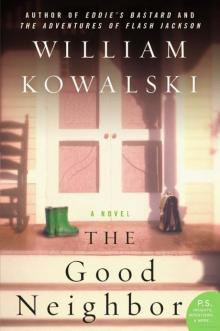 The Good Neighbor
The Good Neighbor Eddie's Bastard
Eddie's Bastard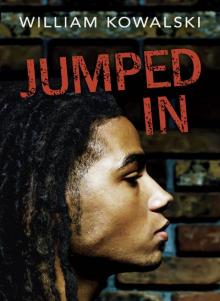 Jumped In
Jumped In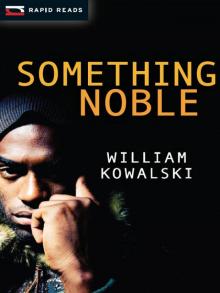 Something Noble
Something Noble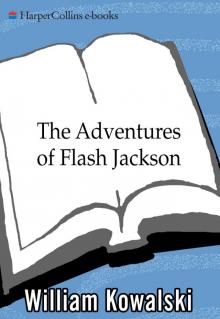 The Adventures of Flash Jackson
The Adventures of Flash Jackson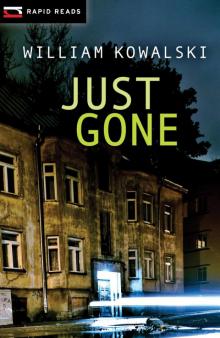 Just Gone
Just Gone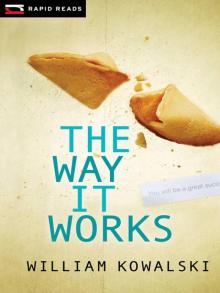 The Way It Works
The Way It Works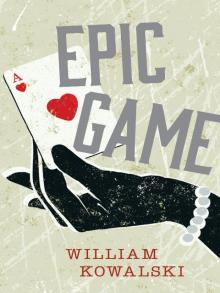 Epic Game
Epic Game